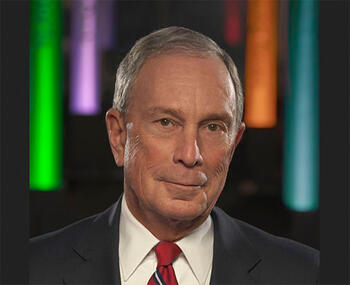
If the tentative entrance of former New York Mayor Michael Bloomberg into the Presidential race materializes, he may discover difficulty of being an oligarch in an increasingly socialist-minded party. Bloomberg, whose fortune is estimated at $50 billion, many times Trump’s estimated $3 billion, much less Tom Steyer’s comparatively meager $1.6 billion, epitomizes the very capitalist class so detested by party activists.
To be sure, unlike Steyer, the 77 year-old Bloomberg , the eighth richest person in the country, already has managed to “buy” elective office, spending $174 dollars per vote to win re-election. In order to match his New York electoral investment, Bloomberg would need to spend an unheard of $12 billion, a fourth of his fortune. But money may not be enough this time.
Bloomberg’s biggest success, continuing Rudy Giuliani’s crackdown on crime, doesn’t fit well in a party increasingly tolerant of petty crime and social disorder on the streets.
He certainly didn’t govern as a social justice warrior: Bloomberg saw New York, in his words, as “a luxury product” built around the interests and investments of his fellow billionaires. Under his reign, New York’s inequality burgeoned while the city wasted billions on an expensive Second Avenue subway, servicing among the country’s wealthiest precincts, even as the subway system most New Yorkers rely on fell into disrepair.
Bloomberg’s predicament now is shared by his entire class, especially the tech oligarchs. Elizabeth Warren and Bernie Sanders not only support breaking their oligopolies but have also criticized their labor practices, stifling of competition and violations privacy.
Dilemma of the gentry
As Sanders put it when Bloomberg announced his intentions: “The billionaire class is scared and they should be scared.” They face increasing problems selling themselves, in the phrase used by progressive writer David Callahan, as a kind of a” benign plutocracy” superior to those who built their fortunes on resource extraction, manufacturing and material consumption.
The reasons are not hard to identify. Over the past few decades, Sanders’ “billionaire” class have consolidated both financial and corporate assets into few hands. Public support for large corporations are all near historic lows. Corporate consolidation also has been linked to ever greater inequality and a diminishing of the middle class.
They may not yet be nearly as unpopular as prototypical baddies like banks or oil companies, but already over two-thirds of Americans, irrespective of party, favor breaking up firms like Amazon, Google and Facebook. The assault on the oligarchs was evident in California’s recent adoption of a bill limiting contract labor threaten already money-losing firms such as Uber, Lyft and Postmates. Google has made itself so unpopular across the aisle that they are being sued for their monopolistic practices by 48 states.
Limits of going green
For the past decade, gentry candidates like Bloomberg have appealed to Democrats by adopting progressive stances on social issues and the environment. But few industries are as male, and white, dominated as media, finance and tech, and they are now lumped in with the much hated “patriarchy.” If he stays in the race, Bloomberg will be forced to defend his record of misogynistic comments.
Even the old gambit of being green no longer works. For all its ludicrousness, the Green New Deal has succeeded in exposing the hypocrisy of the progressive gentry. Bloomberg may want to limit our use of carbon but sees no problem with his taking a private jet regularly to his Bahamas estate. The wealthy climatistas often seek to restrict air travel for the masses, but campaigners continue to fly in private jets, even to climate oriented events.
At the same time, many of the “clean rich” also clean up as active investors in solar and wind energy. But as the oligarchs can feel virtuous and make money, for most families, the current climate regime promises only a degraded quality of life. Despite their capitalist sources of funding, increasingly zealous activists often see our economic system as the primary cause of the impending environmental apocalypse. Convinced that the apocalypse is around the corner, the new activists will not by mollified by corporatist gradualism.
Useful idiots?
In supporting the left, the oligarchs may end up undermining themselves, much like the old French aristocracy in the years leading to the 1789 revolution. Many lost public support by preaching ideas of charity and humility while indulging in gluttony, sexual adventurism and lavish spending. Others backed revolutionary ideas that ultimately led them to lose contact with their heads at the guillotine.
For now, our oligarchs are likely to keep their heads attached, but they seem powerless to stop the transformation of the Democratic Party into a de facto socialist movement bent on confiscating their wealth. Like their globalist, free trade Republican counterparts, who lost out to the populism of Trump, the Democratic grandees are clearly in danger of losing control of their party as well. Amidst the still unfolding revolt from below, the smug progressivism of Bloomberg and the tech oligarchs may prove unsaleable no matter how many millions they throw down the political rathole.
This piece first appeared on The Orange County Register.
Joel Kotkin is the Roger Hobbs Distinguished Fellow in Urban Studies at Chapman University and executive director of the Houston-based Center for Opportunity Urbanism. He authored The Human City: Urbanism for the rest of us, published in 2016 by Agate. He is also author of The New Class Conflict, The City: A Global History, and The Next Hundred Million: America in 2050. He is executive director of NewGeography.com and lives in Orange County, CA. His next book, “The Coming Of Neo-Feudalism,” will be out this spring.
Photo credit: Bloomberg Philanthropies via via Wikimedia under Public Domain License.












